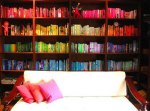The Word Guy is on the road. The upshot of this is that I don’t have access to my OED and that makes it difficult to provide interesting and accurate word etymologies. This, of course, is a marvelous example of why buying the OED on CD is worth doing. If I were to spring for the disk (another $200 – $300 or so depending on where I buy it) I could have mobile access.
So in the absence of my source books – which also includes Joseph T. Shipley’s The Origin of English Words: A Discursive Dictionary of Indo-European Roots and Donald Ayers’ English Words from Latin and Greek Elements – I’ve decided to offer an intermission piece that was originally published in a local periodical. I’ll be back home by the weekend and working on the word sarcasm.
* * * * * * * * * * * * * * * * * * * * * * * * * * *
The Great Library of Alexandria; the Bodleian Library of Oxford; the Library of Congress; and even Jorge Luis Borges’ Library of Babel – all world famous examples of cathedrals to bibliophilia – the love of books. Since the first caveman scrawled the prehistoric version of “Kilroy was here” on the walls of his rocky condo, mankind has sought to record his story, laying the foundations for a cultural existence. And as the number of literary efforts increases, so does the need for cataloging and organizing them. Whether on tablets of stone, in jars of clay, or engraved onto the surfaces of grains of rice, accessing what has been written is as important as the actual content of the text.
When Melvil Dewey devised his system of classification back in the 1870s, who could have thought that this would become the standard method of choice for the world? And who would argue that this relatively simple and efficient system didn’t make life easier for the common reader.
Well, the editor of In Style magazine for one. The February 2006 edition of this veritable vade mecum of fashion answers the age-old question of how best to organize a collection of books. And here is it, in black and white, from page 325:
“Books look best when organized by size or grouped in color blocks.”
So there you have it. Problem solved. And thank goodness, I say, that the Oxford English Dictionary is made up of individual volumes that are (a) all the same color and (b) all the same size. However, bad luck if you’re looking for a copy of the Bible. Considering that there are bibles in as many colors and sizes as rainbows and rocks, finding one might turn out to be a bit of a problem.
Imagine the scenario:
Student: “Excuse me, my fine fellow. Pray, tell me, where might I find the latest offering by that goodly scribe, John Grisham?”
Librarian: “Ah, my honest scholar, wouldst that be the big brown one, the big blue one, or the more portable small black one?”
Student: “Goodness, my educated friend, in truth, I know neither of the size nor the color.”
Librarian: “Ah, my hapless seeker-after-wisdom, then art thou up a raging river without aid of a rowing implement. Without such critical information regarding appearance and girth, I am, alas, unable to help thee in thy quest.”
Student: “Oh, sweet mother of mercy, is there not a way of finding it by, for example, using the first letter of the honorable scribe’s surname of ‘Grisham?’”
Librarian (chuckling softly): “What a unique suggestion, my witty colleague! But if we were to adopt such a method, wouldst it not then make it almost impossible to find, for example, yonder large, green tome? Why, how would I decide where to locate a new middling orange epistle?”
Student (crestfallen and dejected): “Aye, there’s the rub.”
Librarian (surprised): “’Struth, art thou familiar with the contents of the large, thick work – in green, red, and brown – found on the third shelf on the twentieth case in the fourth room?”
Student (equally surprised): “Yes, although in my own humble abode, it is found on the first shelf, next to a fetching gold small tome about a young girl named Alice who finds herself in a bizarre world of fantasy.”
Librarian: “Ah yes, fantasy indeed. A little like your joke about ordering books by letter.
Exeunt Librarian and Scholar, slapping each other’s backs, laughing together at the absurdity.


